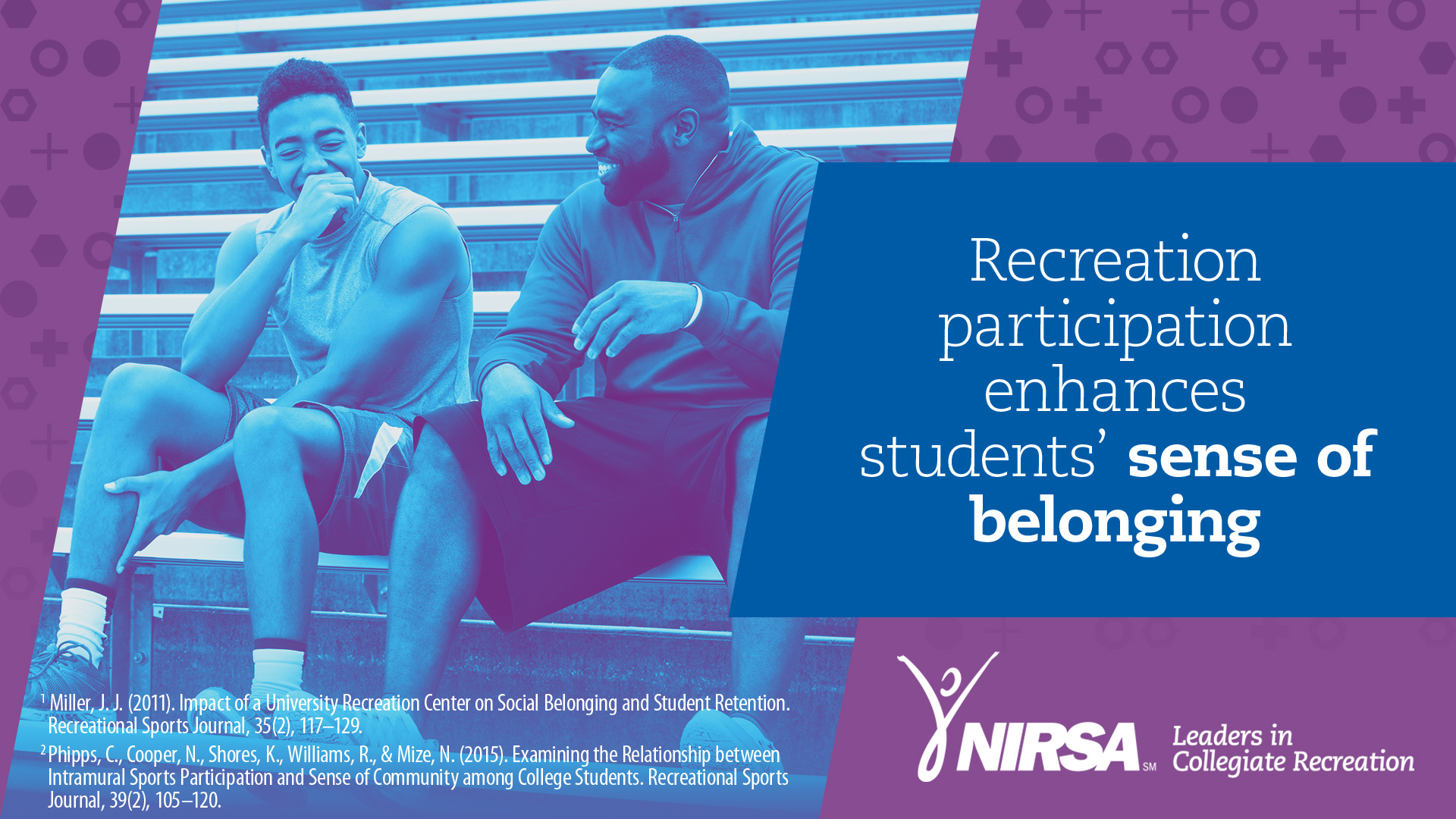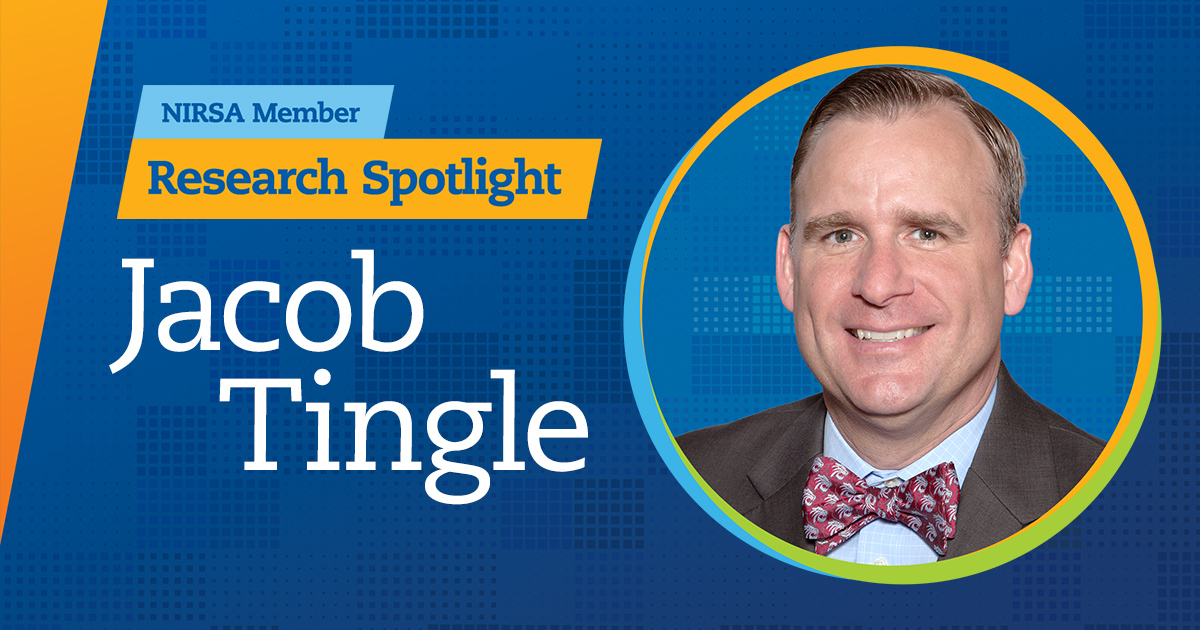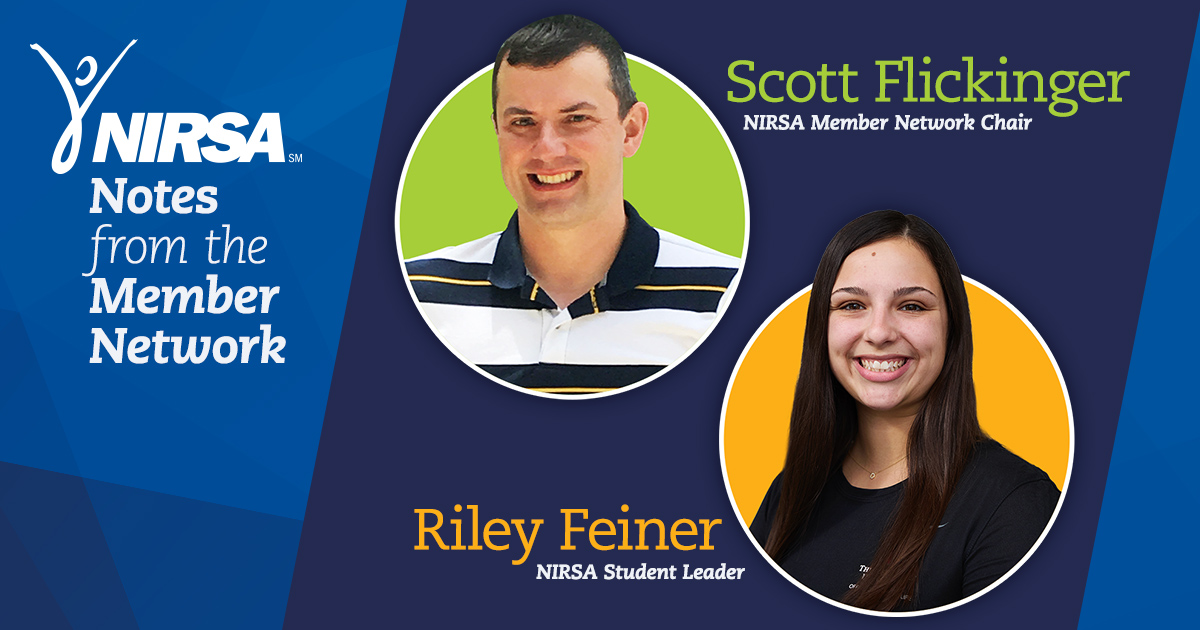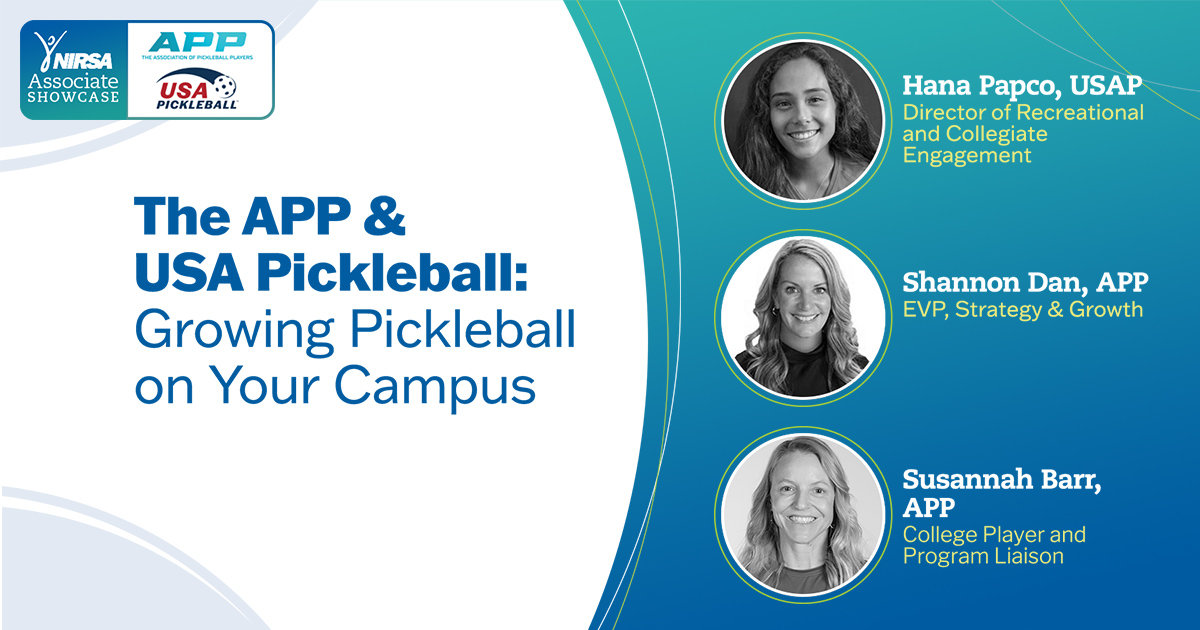NIRSA is excited to shine a spotlight on the exciting research being done by Jacob K. Tingle, Ed.D., Director of Sport Management at Trinity University and NIRSA member since 1994. He is interested in systems that impact the retention of sports officials, with much of his research exploring the students’ sense of community as an important factor; recently, he’s also been exploring mental health and wellbeing outcomes associated with officiating.
Jacob’s recent co-publication “NIRSA Student Referees: Exploring the Connection between Sense of Community and Positive Health and Wellbeing Outcomes” debuted in volume #49, issue #1 of the Recreational Sports Journal. Jacob and his colleagues write to help NIRSA professionals better understand how the communities and networks made through officiating intramural sports can better support student employee wellbeing.
View this post on Instagram
3 questions with Jacob Tingle about his research
We recently caught up with Jacob to ask him a few questions about his research and experiences with the Association.
NIRSA: What is the most surprising thing that you have learned while researching officiating?
JT: “Having done research exploring issues with female referees in other contexts, I was pleasantly surprised to discover that the student referees in our study all indicated how much they felt supported and nurtured, both by fellow officials and by their supervisors. That sense of support is different to findings in previous studies and says a lot to me about NIRSA professionals and how much they focus on creating inclusive spaces where everyone feels that sense of belonging.”
Why should campus recreation professionals be interested in learning more about officials’ development?
JT: “The mental health challenges that many of our students are experiencing are well documented. We know that current college students experience a combination of academic pressures combined with job pressures combined with feelings of isolation, a lack of social support, and less diverse networks. Those challenges can and do lead to negative mental health outcomes. As such, it’s imperative for universities to find ways to help our students connect with each other and to develop an enhanced sense of community or belonging. Our findings suggest that campus recreation professionals have a unique opportunity and are well-positioned to reframe the narrative around sport officiating and student employment by highlighting the impact of those experiences on sense of community, mental health, and overall wellbeing. Highlighting skill building, mental health support (such as question, persuade, and refer or QPR training), flexible scheduling, and creating opportunities for connection should all be part of how NIRSA professionals communicate about campus employment, including refereeing intramural sports.”
Who inspires your scholarly work?
JT: “My co-authors on this study—April Flint, PhD, NBC-HWC, Senior Director for Recreation and Wellness at Emory University and longtime NIRSA member and President Elect on the NIRSA Board of Directors, Brittany Jacobs, Associate Professor & Department Chair, Sport Management & Esport for American Public University System, and Stacy Warner, Professor of Sport Management at East Carolina University—are role models, both in terms of their ability to create community and foster belonging, and also in their practice and scholarship.
If individuals are interested in exploring the topic of mental health and sports officiating, I encourage you to explore the work of Tom Lishman, Gavin Breslin, Noel Brick, Tom Webb, Claire Barrows, Stéphanie Radziszewski, and Paul Gorczynski. Reading the work of Stacy Warner and Lynn Ridinger are great places for NIRSA members to learn more about the sense of community.”

Do you have a favorite NIRSA memory?
JT: “Oh wow. So many great memories. Becoming an All-American Flag Football Official in New Orleans. Hosting NIRSA Campus Championship Series (NCCS as it was known then) events while at Maryland. Spilling coffee on Jarrod Jackson at the University of Houston basketball regional. Dolphin CPR at the Reno National Conference all come to mind.
But three biggies for me include:
- My first NIRSA Conference was the 1995 conference in Albuquerque. During that event, I met three of my mentors Jeff Kearney, Assistant Director of Campus Recreation Services at the University of Maryland in College Park, Darci Doll, Associate Director for Intramurals at the University of Texas at Austin, and Barbara Aiken, Associate Director, Programs at University of Maryland-College Park. My life changed forever when I said yes to Maryland’s offer of a graduate assistantship.
- I’ll never forget meeting Sheldon Tate, Executive Director of Recreation at George Mason University for the first time. He was a freshman, officiating at a regional flag football tournament happening at Baylor University. I was on Field 15 evaluating officials and he was officiating on Field 7. Let’s just say that his presence was felt half a mile away!
- National Intramural Basketball Championships. Atlanta. Georgia Tech. 2008. Special tournament. Special people. And one magical night during which the idea of creating a tournament ‘manual’ was born; the seed that has blossomed into the NIRSA Championship Series.
NIRSA, as an association, and our members, have been and continues to be a deeply important part of my life.”
What campus rec professionals are saying about the research
Here’s what campus recreation professionals are saying about Jacob Tingle’s work:
“Just as the authors mentioned, our society is becoming more invested in organized sport experiences. As folks sign themselves or their children up to play at ever-increasing rates, the shortage of referees to administer the competitions is moving in the opposite direction. Anyone who wants to help address the challenges of referee recruitment, development, and retention would do well to read Tingle et al,” says Sheldon Tate, Executive Director of Recreation at George Mason University.
Additionally, “this study also presents a compelling argument around the benefits of on-campus employment for students,” Sheldon adds. “Any university administration desiring to improve their institution’s engagement, retention, and success metrics would be intrigued by the authors’ study. When campus rec professionals understand the value of studies like this one, we can position ourselves and our departments in an elevated way. On that path of elevation, departments give themselves an opportunity to thrive in even the most difficult seasons of operation. A shift away from casual storytelling and towards peer-reviewed research may show our campus administrators just how serious we are about delivering the outcomes they seek,” he adds.

“After reading this article, you will have a better understanding of the connection between sports officiating and the positive impacts it has on individuals involved,” says Steve Waden, Director – Facility Operations & Project Management at Texas Tec University. “Our chosen profession allows us to be a part of the critical vehicle for these opportunities for our young people. Being well-informed and supportive of the data gathered in this article will allow us the ammunition needed to encourage our youth to become or remain sports officials,” Steve adds.
“The shortage of officials across sports is one that we are all very aware of; campus recreation professionals feel it probably more than most, as it’s a challenge we have faced our entire careers,” says April Flint, PhD, NBC-HWC, Senior Director for Recreation and Wellness at Emory University. “This article is important for campus recreation professionals as it refocuses the conversation on why sports officials stay in officiating, not why they leave. Campus recreation professionals can take this information and better understand how the community or social networks made through officiating intramural sports could better support student employee wellbeing,” adds April.
“Despite the complexity of sport officiating through managing antagonistic and abusive relationships, officiating can positively impact wellbeing and officiating communities can provide social support. Adding sports officiating to the wellbeing conversation is essential as we must continue to find ways to connect our college students to various communities,” April says. “Findings in this research suggest that intramural sports officiating encourages positive wellbeing practices. We must capitalize on this information now in our recruitment, training, and retention of sports officials, otherwise sports officiating will continue to see declines that will negatively impact the sport experience for all,” she adds.
NIRSA supports industry research
“NIRSA Student Referees: Exploring the Connection between Sense of Community and Positive Health and Wellbeing Outcomes” was featured in NIRSA’s Recreational Sports Journal (RSJ). NIRSA members receive a subscription to the RSJ as a benefit of membership.
Additionally, NIRSA runs a grant program designed to support the development and dissemination of research in the field of collegiate recreation. NIRSA’s Research Agenda guides the Association’s support by identifying critical areas within the profession for investigation. The Research Agenda aligns with the Association’s Strategic Values and Core Competencies and reflects an intention to spur research that reinforces the importance of our values and the competencies of the profession.
Researchers are encouraged to apply for support from NIRSA, especially when that research aligns with Association priorities.
- For more information, contact NIRSA Member Programs Coordinator, Cheyenna Mitchell.






